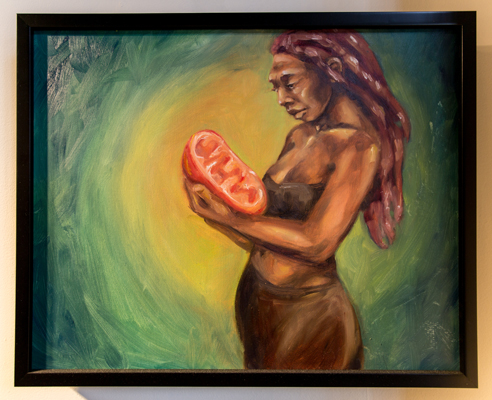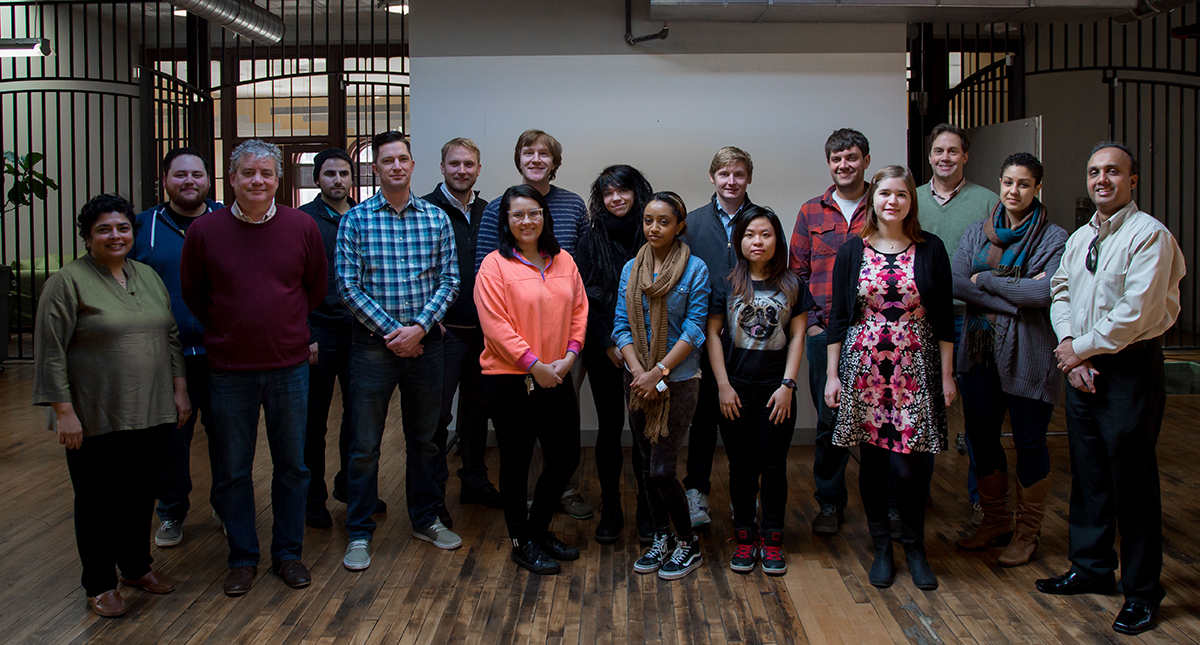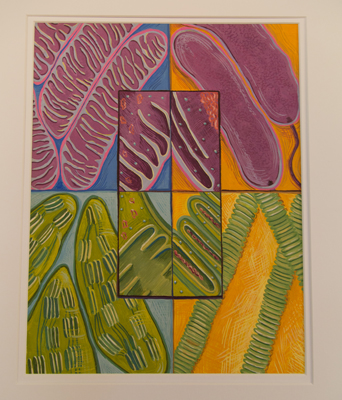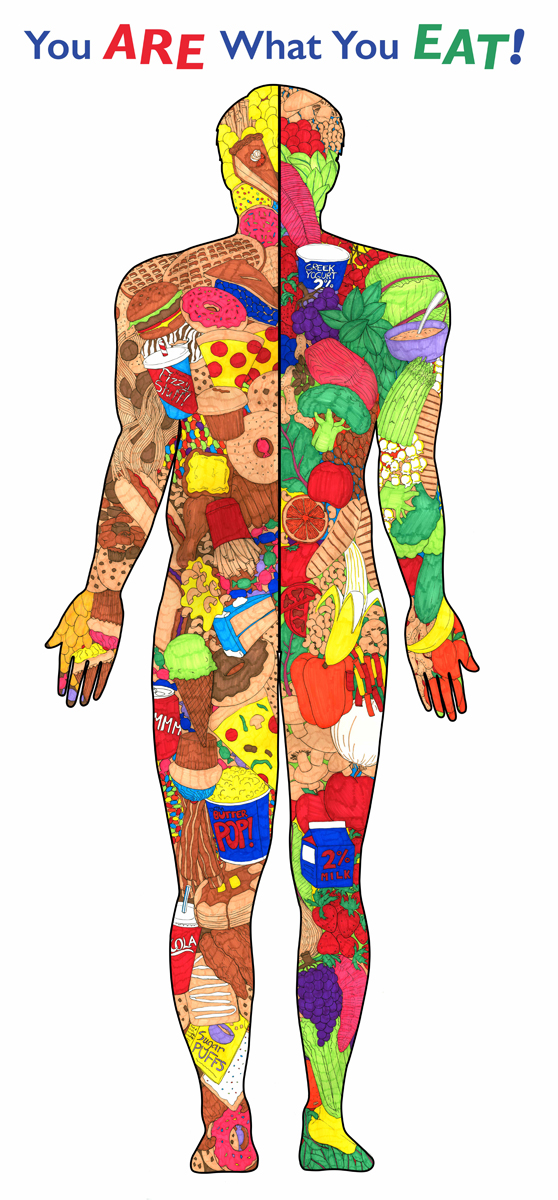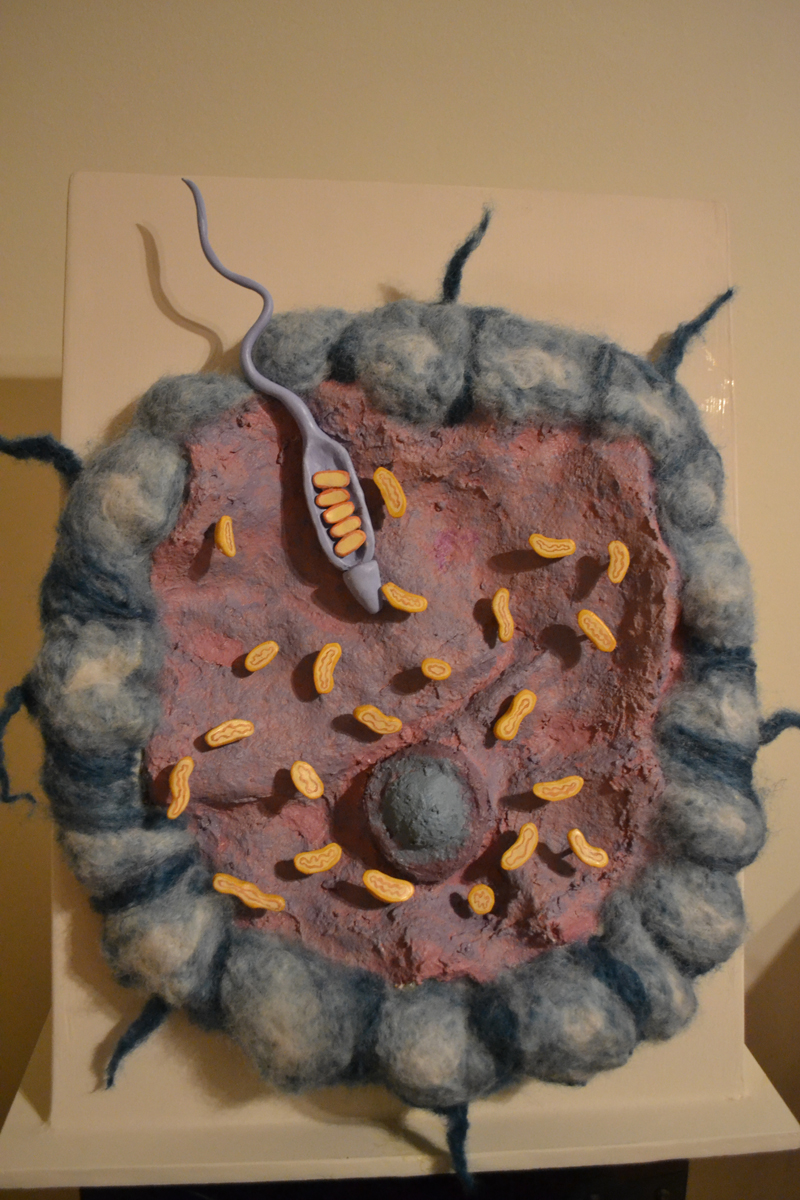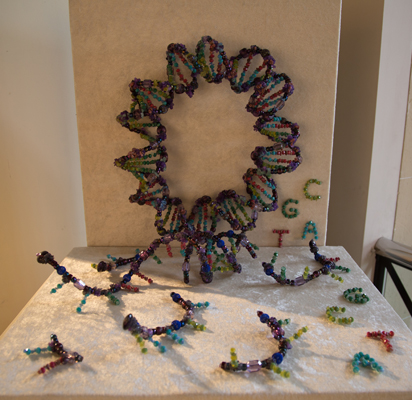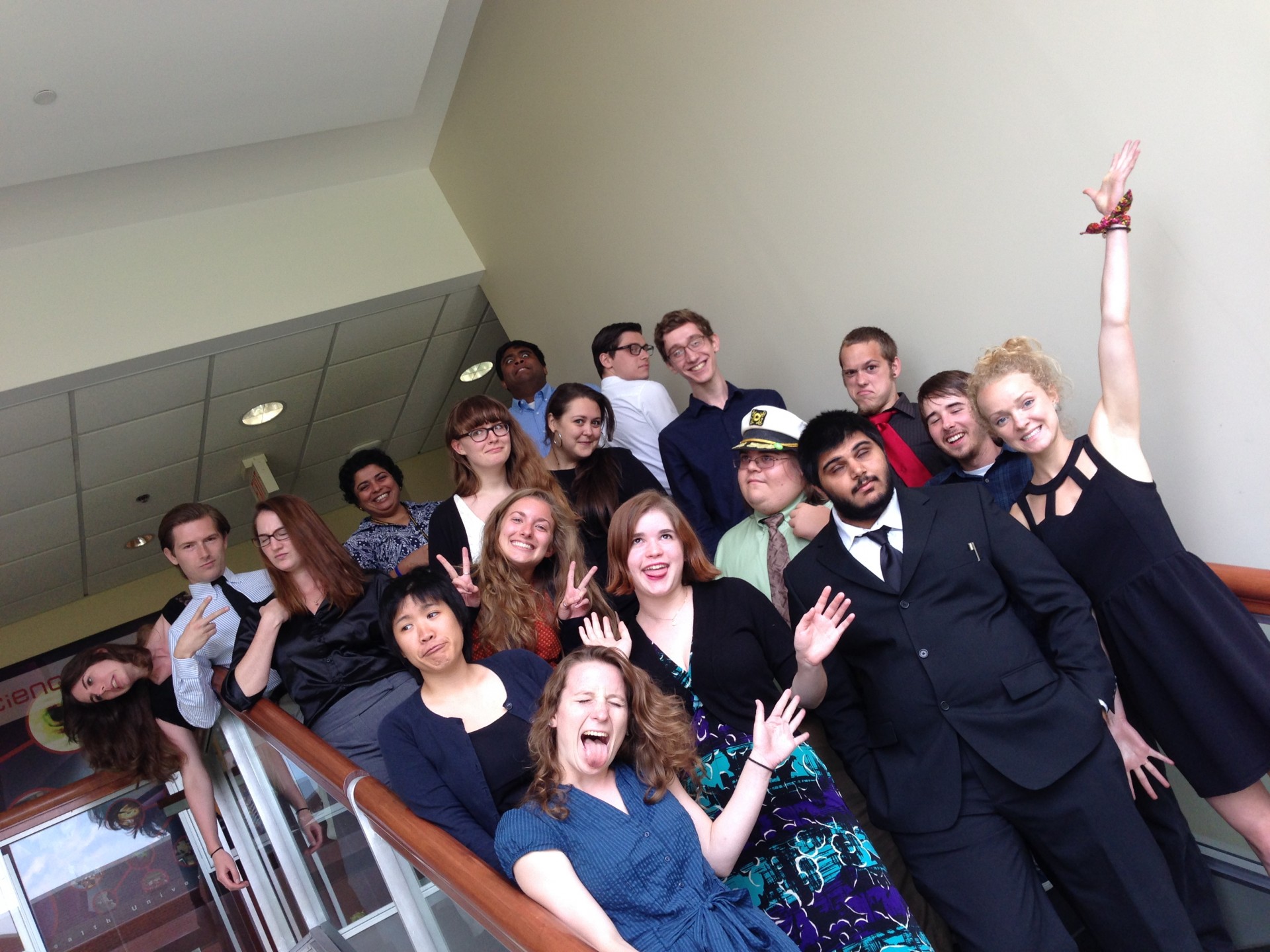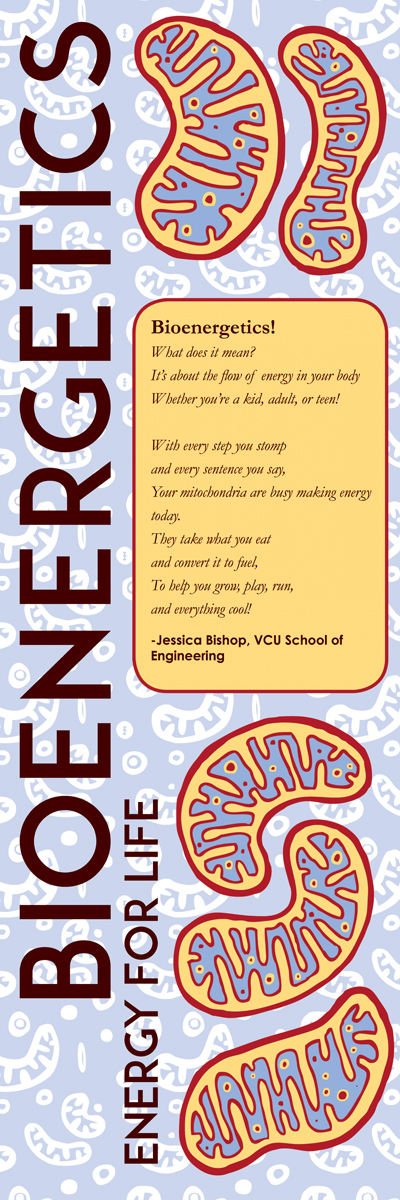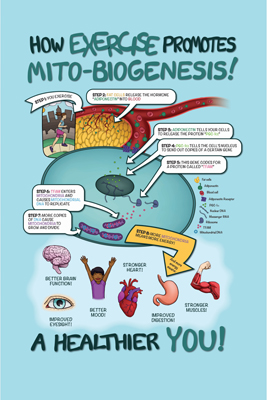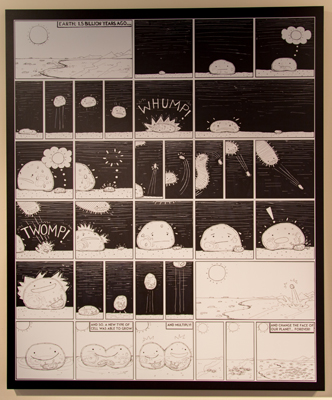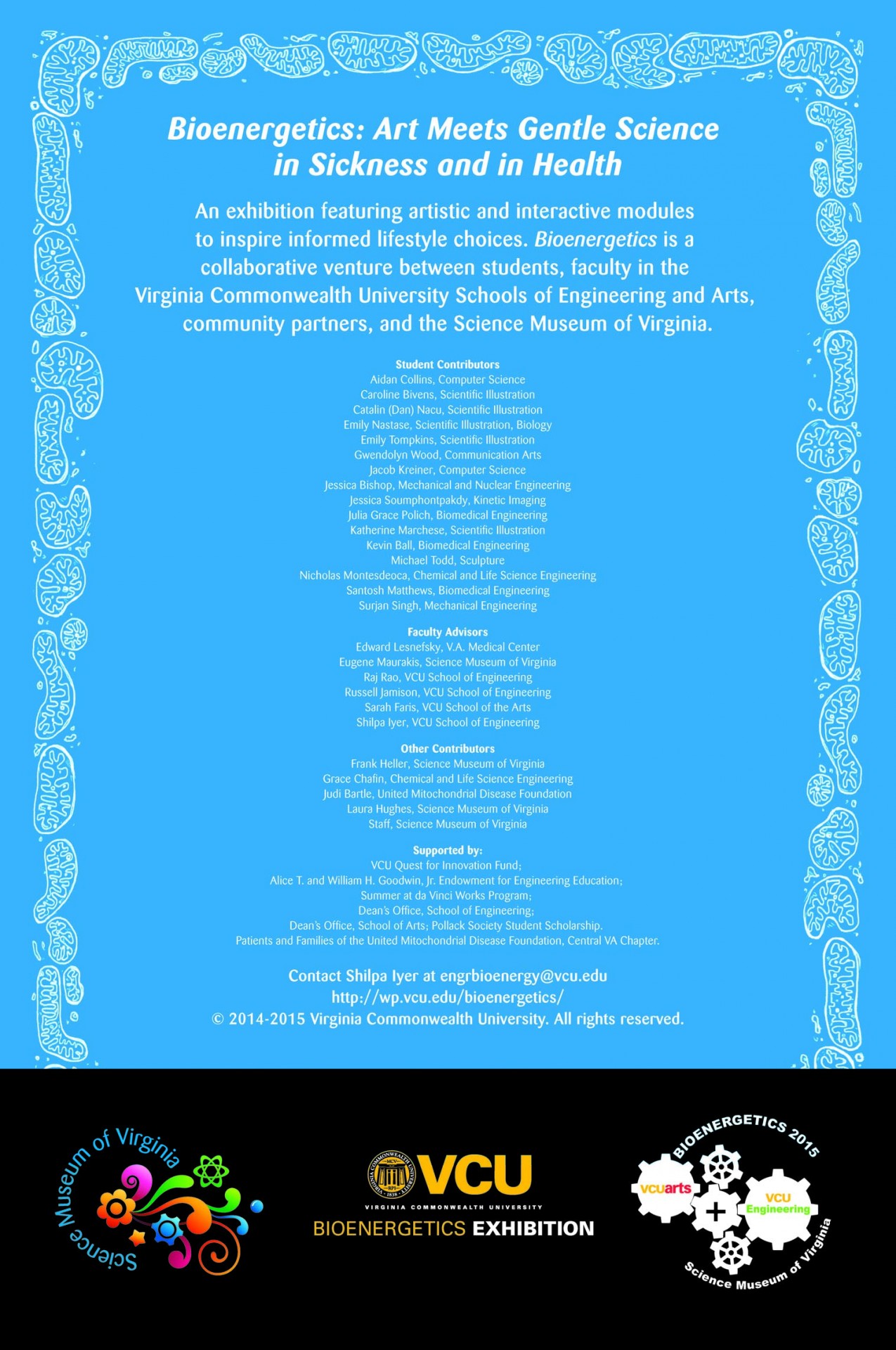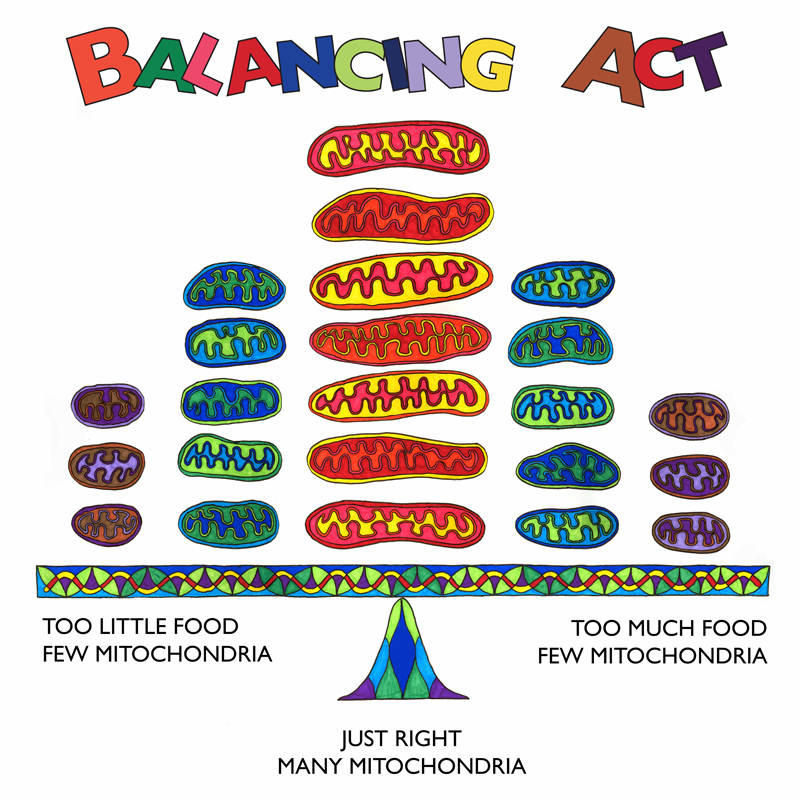WELCOME TO BIO-E SPACE
Welcome to Bio-E Space in the Laboratory of Cellular Energetics and Mitochondrial Disorders. We are located in the Daniel E. Ferritor Hall (FERR), Department of Biological Sciences at the University of Arkansas, Fayetteville. To learn more about our research interests, current lab members, collaborators, outreach activities and current research opportunities, please use the navigation links on top or right of the page.
WHAT IS BIO-E?
Bioenergetics (or Bio-E) is the study of the flow of energy in living systems within specialized cellular compartments called ‘Mitochondria’. They are the energy powerhouses of the cell. Mitochondria create more than 90% of the energy needed by the body to sustain life and support growth.
WHAT HAPPENS WHEN MITOCHONDRIA FAIL?
When the mitochondria have problems, the energy our cells need to make our body work is diminished; and this can cause disease and aging. The diseases primarily affect children, but adults also are affected. Diseases of the mitochondria affect the cells of the brain, heart, liver, muscles, kidney, the endocrine and respiratory systems. Symptoms may include loss of motor control, muscle weakness and pain, gastro-intestinal disorders and swallowing difficulties, poor growth, cardiac disease, liver disease, diabetes, respiratory complications, seizures, visual/hearing problems, lactic acidosis, developmental delays and susceptibility to infection.
Research
Our research program broadly involves understanding the genetics of and developing therapies for childhood and age-related mitochondrial diseases. We are generating patient-specific stem cells to facilitate therapies and understand cause and progression of mitochondrial diseases. Skin cells from a patient diagnosed with mitochondrial and other energy-deficiency diseases are being genetically reprogrammed into stem cells, and then transformed into neurons and muscle cells. Further studies will lay out the many steps in cellular bioenergetics that will help in understanding how stem cells are transformed into neurons and muscle cells in normal and diseased patients.
IYER LAB

Shilpa Iyer, PhD
Associate Professor of Biological Sciences
Principal Investigator: Dr. Iyer is an Associate Professor in the Department of Biological Sciences. Prior to joining UA, she was Research Scientist in the Department of Chemical and Life Science Engineering at Virginia Commonwealth University. She received her postdoctoral training in mitochondrial genetics at the Department of Neurology, School of Medicine, University of Virginia. She earned her Ph.D. in molecular genetics from the Department of Genetics at the University of Georgia. Please click here for brief vitae.

Joshua Stabach
Research Assistant
Joshua joined the lab in Fall 2017. He received a B.S in Clinical Genetics from University of Connecticut and has many years of experience in clinical settings and in cytogenetics labs. He is currently involved in projects that involve mammalian cell culture, biochemistry, and respirometry techniques.

Fibi Meshrkey
Graduate Student
Fibi joined the lab in Spring 2019. She has undergraduate degree in medicine, with postgraduate training in histology and cell biology from the University of Alexandria, Egypt. Her area of research is focused on better characterizing the differentiation of stem cells towards muscle lineages in the context of Leigh’s disease.

Indrachapa Ekanayaka
Graduate Student
Indrachapa joined the lab in Fall 2022. She has an undergraduate degree in Immunology and Integrative Molecular Biology, from the Faculty of Science, University of Colombo, Sri Lanka. Her area of research will be based on better understanding the how defects in mitochondrial genetics lead to changes in cell fate and disease, using stem cell models.
Publications
Copyrights and Invention Disclosures
- “The Great Cellular ReefTM- This techonoloy is available for licencing for commercialization. Please click here for details.
- “Might!TM The Energy Making Game”- VCU #16-062. Prototype Game is fully developed and has been tested.
Registered Copyright 2016. This technology is available for licensing to industry for further development and commercialization. Please click here for details.
Images and Techniques
Past Members
- Rupal Bohra, Undergraduate Researcher, 2017.
- Chloe Cantrell, Undergraduate Researcher, 2017.
- Ahmed Dhamad, Postdoctoral Fellow, 2017-2018.
- Myles Joyce, STEAM-H Undergraduate Researcher, 2017-2018.
- Khandi Gordon, STEAM-H Undergraduate Researcher, 2017-2018.
- Austin Richards, STEAM-H Undergraduate Researcher, 2017.
- Chase Wyatt, STEAM-H Undergraduate Researcher, 2017.
- Raquel Palmer De Castro, Graduate Student, 2017-2019.
- Julienne Daniel, Undergraduate Researcher, 2017-2019.
- Anapaula Rojas, Undergraduate Researcher, 2018-2019.
- Abigail Harris, Undergraduate Researcher, 2018-2019.
- Joseph Strange, Undergraduate Researcher, 2018-2019
- Brooke Henry, Undergraduate Researcher, 2018-2020.
- Austin Bell, Undergraduate Researcher, 2018-2020.
- Ana Cabrera Ayuso, Fulbright Scholar, 2019-2020.
- Ajibola Bakare, Graduate Student, 2016-2021.
- Bibhuti Saikia, Postdoc, 2019-2022.
- Leah Cuthill, Research Assistant, 2021-2022
Teaching
Courses at UARK
BIOL 2533. Cell Biology; Spring 2017,2018 . 3 Hours.
Introduction to cell structure, cell processes, biological polymers, energetics, and diversity. An introduction to biochemistry and cell chemistry. Pre- or Corequisite: (CHEM 1123 and CHEM 1121L) or (CHEM 1223 and CHEM 1221L) or (CHEM 1133 and CHEM 1131L) or equivalent. Prerequisite: BIOL 1584 or BIOL 1543 and BIOL 1541L.
BIOL 480V/580V. Mitochondrial Medicine; Fall 2018. 3 Hours.
This course will give an overview of mitochondrial biology with a slant towards the clinical spectrum of human diseases affected by dysfunctional mitochondria. It will introduce students to basic mitochondrial biology, such as structure and function, genetics and bioenergetics. The course will highlight the different inherited and acquired diseases that are impacted by the mitochondria. Emphasis will be placed on presentations and discussions of current research areas and papers in this rapidly evolving field. The final project will require student teams to develop a public engagement video/applications/website/ targeted to K-12 students. The class is designed for graduate students and upper undergraduates with a strong interest in mitochondrial biology and medicine and the desire to actively contribute to discussions in the class..
BIOL 480VH. Special Topics- STEAM-H; Fall 2017, Spring 2018. 1-3 Hours.
The STEAM-H team will participate and adopt cutting-edge transdisciplinary STEAM-H (Science, Technology, Engineering, Architecture/Arts, Mathematics, Health) team-based approaches by incorporating concepts from engineering design and artistic creative expression to create novel interactive educational modules to teach and engage a wide audience on contemporary public health issues in a fun and meaningful way.
Outreach & Education
We aim to spread awareness using gentle science approaches, as encouraged by Dr. Gnaiger. Our gentle science approaches recognizes the responsibility of the scientific community- for the quality of science, the quality of life in science, and its mission. This holistic learning environment and community engagement enables faculty and students to use contemporary digital technologies to spread awareness of mitochondrial health in realistic ways. Our past efforts led to a 3-month long exhibition at the Science Museum of Virginia. Please take some time to browse some of our work, displayed below.
Why STEAM-H approach?
A joint report from the National Science Foundation (NSF) and the National Endowment for the Arts (NEA) stated that, “The arts, the sciences and engineering uniquely contribute to the understanding and improvement of the human condition.” Therefore, a productive synergistic approach developed with mutual respect addressing questions of mutual interest, will lead us from STEM to STE(A)M to STEAM-(H) initiatives to communicate public health concerns.
What are our Goals?
With energy deficiency disorders on the rise, health and nutrition are important concepts for youth to understand. Our program provides students with opportunities to be involved in health-focused innovative problem-solving projects that is engaging and fun with the goal towards product development and increasing knowledge of mitochondrial health and bioenergetics
Publications and Presentations
- Tompkins, E., Faris, S., Hughes, L., Maurakis, E., Lesnefsky, E.J., Rao, R.R., and S. Iyer. (2017). Arts, Science, Engineering and Medicine Collaborate to Educate Public on Bioenergetics. Research Reports. [S.l.], v. 1, n. 1
- Iyer S, Woolman M, Rao RR. A science-based strategy game for understanding mitochondrial bioenergetics. 10th MiP School-Mitochondrial Physiology Society, Obergurgl, Austria. (Talk). (2017)
- Iyer, S., Rao R.R., Faris, S., Heller, F., Hughes, L., Jamison, R.D., Lesnefsky, E.J. and Maurakis, E. Bioenergetics Education: Art Meets Gentle Science In Sickness And In Health. Experimental Biology Annual Meeting (Poster)(2016).
- Iyer, S., Faris, S., Rao R.R., Maurakis, E., Lesnefsky, E.J. and R. Jamison. Arts and Engineering produce exhibits to promote mitochondrial health. Annual meeting of the United Mitochondrial Disease Foundation. (Talk).(2015).

The 2017-2018 STEAM-H Team comprised of faculty and students from Biology, Biochemistry, Biomedical Engineering, Chemical Engineering, Civil Engineering, Computer Science, Mechanical Engineering, Architecture. Photo taken during a field trip to the Arkansas State Veterans Home at Fayetteville
STEAM-H Multimedia Outcomes
A Short Poem on Bioenergetics- Ayman Khan
From head to toe
In my body there is energy flow
It makes me read, jump and play
At night and all through the day
The energy in me is so rich and pure
It comes from what I eat and drink I am sure
How does it come and how does it go?
I believe there is a science that makes it flow
From atoms, to molecules to cell all in a row
If in a game of tennis I get knocked
The energy in me must have been blocked
To make myself awesome and athletic
I need to tune my body to being bioenergetic
In Tune- Kevin Ball
Nature the orchestrator
Waves her arms
Striking the first chord
of her ancient song
The audience seized
Dances to the familiar hum
Each, carried by the flow
Wound and spun
As the music slows
A greater force appears
The product of unity
Attributed to all
A reminder of the linkage
The most fundamental bond
Reliance on the whole
Improbability of being one
Ode to Mitochondria- Shilpa Iyer
O mitochondria!
Engulfed by bacteria
You constantly divide
Comfortably inside
To break down food
And release energy
And radicals all free
Cause havoc constantly
Some call it ROS
Others oxidative stress
Too much free oxygen
Is bound to be a mess
O mitochondria!
Important are you,
As each and every area
Need energy or two.
Alive in our body parts,
Beating in every heart
And in brain-muscle-retina,
Till death do us part.
A short poem on Bioenergetics- Jessica Bishop
Bioenergetics, what does it mean?
It’s about the flow of energy in your body
Whether you’re a kid, adult, or teen!
With every step you stomp
And every sentence you say,
Your mitochondria are busy making energy today.
They take what you eat
And convert it to fuel,
To help you grow, play, run,
And everything cool!
Listen to Dr. Shilpa Iyer explain the story behind the exhibition, the creative process and the outcomes.
Thanks to Prabir Mehta for creating this beautiful video that provides a virtual tour of the exhibition held at the Science Museum of Virginia. To know more about Prabir, click here.
The videos convey the stories of many mito-warriors and their families who go through each day of their lives with courage and dignity. We are very humbled that they opened their hearts to share their stories with us so that we could learn more about mitochondrial disease.
A series of three digital shorts on ‘Bioenergetics’ produced by students from multiple disciplines in two days. Part of an exercise forcing them to think about energy in different forms and connections between different systems and elements.
A short video on STEAM-H produced by students from multiple disciplines in Arts and Engineering as part of the VIP-CoLab joint program.
COLLABORATORS
Erich Gnaiger, Ph.D
Professor: Dr. Gnaiger is a Professor at the Medical University of Innsbruck and CEO of Oroboros Instruments, Austria. Please click here for brief vitae.
Edward J. Lesnefsky, Jr., MD
Professor of Biochemistry, VCU; Chief of Cardiology, VA Medical Center, Richmond, VA: Dr. Lesnefsky works primarily at McGuire V.A. Medical Center where he is Chief of Cardiology, but his activities include administration, basic research and clinical cardiology at both McGuire VA Hospital and at VCU Medical Center. Please click here for brief vitae.
Franklin D. West, PhD
Associate Professor: Dr. West is Associate Professor in the Department of Animal Science at the University of Georgia. Please click here for brief vitae.
Gregory A. Buck, Ph.D.
Professor and Director, Center for the Study of Biological Complexity: Dr. Buck is Professor in the Department of Microbiology and Immunology, VCU School of Medicine and Director, Center for the Study of Biological Complexity. Please click here for brief vitae.
Raj R. Rao, Ph.D
Professor: Dr. Rao is Professor and Department Head of Biomedical Engineering at the University of Arkansas. Please click here for brief vitae.
Kyle Quinn, Ph.D
Assistant Professor: Dr. Quinn is Assistant Professor of Biomedical Engineering at the University of Arkansas. Please click here for brief vitae.
Past Collaborators
Matt Woolman, Graphic Design, Executive Director of Entrepreneurship, VCU School of the Arts
Andrew Ilnicki, Director of Academic Technology for VCU School of the Arts.
Jeff Foster, Assistant Director with the Center for Creative Economy, VCU School of the Arts
Sarah Faris, Communication Arts, VCU School of the Arts
Eugene Maurakis,Ph.D. Museum Scientist, Science Museum of Virginia; & Faculty, Department of Biology, University of Richmond
Russell D. Jamison, Ph.D. Professor, Biomedical Engineering, VCU School of Engineering
Get Involved
INTERESTED?
Please contact Dr. Iyer (si012@uark.edu) if you are interested in research and public engagement activities. We are looking for motivated postdoctoral fellows, graduate and undergraduate students to join us.
News
2016 News
August 2016: Ajibola Bakare joins the BioE lab as the first PhD student through the CEMB program!! Welcome Aji!!
October 2016: We are excited to announce funding from the Department of Defense for our research!! Check out the news wire article here !!
October 2016: INBRE Workshop on STEAM-H at the Kittrell Art Gallery ! Thank you organizers!!
2017 News
February 2017: Joshua Stabach joins the BioE lab as our Research Assistant. Welcome Josh!! And a trip to Georgia to learn about Stem cell culture techniques and meet our mentors! Aji sitting at my old desk when I was a graduate student at UGA!!
March 2017 : Our first Lab meeting !! The lab is growing! Full of undergraduates and Aji!!
April 2017: Honored to have been invited to present ongoing research at the Southeast Regional Symposium on Mitochondrial Medicine at Birmingham, Ala. The events were sponsored by Mitochondrial Medicine and United Mitochondrial Disease Foundation. For more details click here!!

May 2017: Excited about starting STEAM-H at UArk in partnership with the Fayetteville Chamber of Commerce. Thanks to the many hands and minds who are making this happen!! For more information please read here!!
June 2017: Oral presentation at the National Annual Meeting of the United Mitochondrial Disease Foundation at Washington, D.C. Great symposium for networking with physicians, researchers, patients and families students and postdocs.
July 2017: Oral presentations on ongoing research and education at the 10th MiPschool 2017 MITOEAGLE and MITOEAGLE Workshop WG1-4 at Obergurgl, Austria. Check conference website for details. Click here for Programme details
August 2017: Raquel Palmer joins the BioE lab as as the second PhD student through the CEMB program!! Welcome Raquel!!
September 2017: Presented a seminar at Biomedical Engineering at University of Arkansas. Thank you Kartik for the invite!
October 2017: INBRE Workshop on STEAM-H. Thanks to the organizers for providing us a forum to showcase our STEAM-H efforts. We are so thankful for the space provided to us at the Brewer Family Entrepreneurship Hub
November 2017: Oral presentation at the MiP2017/MitoEAGLE Hradec Kralove CZ. Check conference website for details. Left : with Jedi Masters : Prof. Charles Hoppel (center) and Prof. Erich Gnaiger (right).
December 2017 :The BIOE-Padawans are definitely settling in … “May the midichlorian force be with you”
2018 News
May 2018 : Excited about recent publication in PLoS One. Check out the newswire article by clicking here.
June 2018: We are happy to receive a one-year grant from the Arkansas Biosciences Institute to better understand impact of pathogenic mtDNA deletions in early development!!
August 2018: Congratulations to Aji on receving a ‘Best Poster Award‘ at the 2018 United Mitochondrial Disease Foundation Symposium held at Nashville!! Olivia from our collaborator’s (Kyle Quinn) presented results at the Second Britton Chance International Symposium on Metabolic Imaging and Spectroscopy. Check out the newswire article by clicking here.
August 2018: Presented our ongoing research at the 20th European Bioenergetics Conference in Budapest. Check conference website for details.
October 2018: Aji, Raquel and Kelly our collaborator’s (Frank West) presented at the Cold Spring Harbor Laboratory Meeting focuses on All Things Mitochondria. Check conference website for details.
November 2018: INBRE Workshop on ‘Visualizing Mitochondrial Dynamics’. Thanks to the organizers for providing us a forum to showcase our research efforts. Check conference website for details.
2019 News
January 2019: Lab welcomes Fibi Meshrkey, an MD from Egypt, who is pursuing a PhD in the CEMB program.
February 2019: Super-excited to receive a two year NIH-R21 grant titled ‘Development of quantitative biomarkers for mitochondrial disorders’, along with Kyle Quinn in Biomedical Engineering. Please click here for newswire article.
May 2019: Lab welcomes Bibhuti Saikia, PhD from Madurai Kamaraj University, who has joined the lab as a Postdoc.
August 2019: Lab welcomes Regina Cabrera, a Fulbright Scholar from Guatemala, who is pursuing a MS in the CEMB program.
September 2019: Excited about outcomes from STEAM-H that resulted in a science-based strategy game. Please click here for newswire article.
2020 News
April 2020: Super-excited to receive a two year DoD grant for development of ‘heart-on-chip system for mitochondrial diseases, with Kartik Balachandran in Biomedical Engineering. Please click here for newswire article.
May 2020: Honored to have been selected as the 2020 class of Connor Faculty Fellows Please click here for newswire article.
